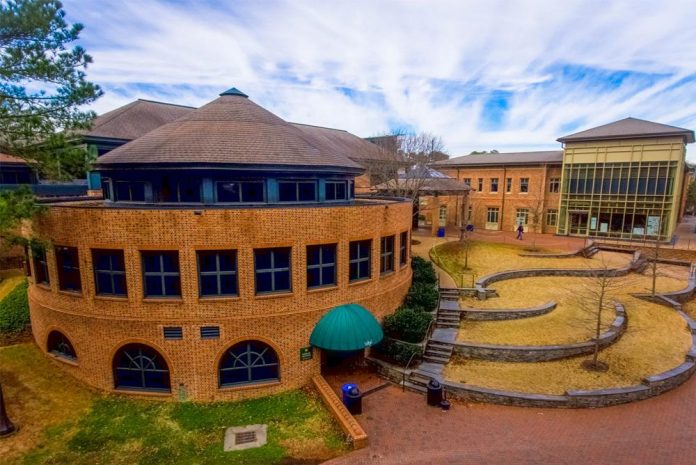April 3, the Office of Community Engagement hosted a panel on economic sustainability in Williamsburg. Students and faculty from the College of William and Mary engaged in conversations with Shawneeka Selby, owner of accounting firm Selby Professional Bookkeeping, and Erin Burke, principal planner for the city of Williamsburg.
The panel opened with general questions about the concept of economic sustainability in Williamsburg.
“From a planning perspective, economic sustainability means the ability to attract and retain businesses of varying sizes and varying industries,” Burke said. “In the city of Williamsburg, we have these two really interesting drivers: we have the College and we have Colonial Williamsburg. But somewhere in between there, we have small businesses, locally-owned businesses, and we have chains that come in there. It’s trying to find the right mix and balance of those and maintaining the workforce to keep the businesses here.”
“From a planning perspective, economic sustainability means the ability to attract and retain businesses of varying sizes and varying industries,” Burke said. “In the city of Williamsburg, we have these two really interesting drivers: we have the College and we have Colonial Williamsburg. But somewhere in between there, we have small businesses, locally-owned businesses, and we have chains that come in there. It’s trying to find the right mix and balance of those and maintaining the workforce to keep the businesses here.”
A large topic of the panel was the role of the local and state governments in assisting local businesses and promoting economic stability.
“I take the perspective from the connection with local business and government in the sense that the local businesses are the ones that collect the tax,” Selby said. “We are the ones that charge the consumer, and the government sets the rules. A lot of business owners just want to do business and not worry about the tax side of things, but the government definitely influences us. It starts with us, as an individual person, and we create a product, and from that service and sales, oftentimes there is a share that goes back to the government.”
Selby discussed her business’s journey and described her encouragement of other local business owners in facilitating productive management.
“For me, I started at the bottom of the totem pole, and I’m still building,” Selby said. “A lot of the obstacles I face here in town is getting other business owners to see the importance of having proper accounting for their businesses.”
“For me, I started at the bottom of the totem pole, and I’m still building,” Selby said. “A lot of the obstacles I face here in town is getting other business owners to see the importance of having proper accounting for their businesses.”
Some students attending the panel had a personal connection to small businesses and economic sustainability, such as Lani Davidoff ‘21, whose father is a small business owner in Connecticut.
“It definitely reminds me that you need to invest in small businesses; it’s important to realize that there are people putting so much time and effort into their small business,” Davidoff said. “It’s shown me the importance of shopping small. There are so many places to choose from, so you might as well choose from a place that has people you know.”
The panel then turned to narrower questions about economic development in Williamsburg–James City County. Burke discussed some specific improvements in the city of Williamsburg that aim to increase economic growth and foster environmental sustainability.
“Recently, the City adopted an ordinance that allows for solar panels to be installed,” Burke said. “There are some regulations that are associated with the architectural preservation districts; obviously you wouldn’t want solar panels in front of the Governor’s Palace. It’s not really appropriate, but for businesses or even for homes, the City has recognized that need.”
Burke also discussed Williamsburg’s plans for more public events throughout the year.
“Grand Illumination is huge here, Fourth of July is huge here, then you have those sort of shoulder seasons, where if you could not just attract visitors, which we get a ton of for those two events, but make sure that there’s locals here to enjoy those activities as well,” Burke said.
“Grand Illumination is huge here, Fourth of July is huge here, then you have those sort of shoulder seasons, where if you could not just attract visitors, which we get a ton of for those two events, but make sure that there’s locals here to enjoy those activities as well,” Burke said.
Another key issue in the discussion was the Williamsburg Downtown Vibrancy Plan, a proposal that encourages retail and residential development in the city of Williamsburg. The plan allots $150,000 to the Economic Development Authority for downtown development in Williamsburg, focusing on attracting pedestrians and increasing the downtown area’s appeal to tourists and residents alike.
“The key to attracting businesses downtown is to have people living downtown,” Burke said. “The key there is to focus on certain areas of the downtown that are prime for redevelopment in a mixed-use sense; so you’d have a first floor of commercial space, and then you’d have second, third and possibly fourth floors of residential space. The idea there is that if you create this hub of people, you’ll attract businesses that want to be within that hub.”
With a focus on downtown revitalization and promoting local businesses, the city of Williamsburg is working on its economic sustainability. Some development projects, such as Midtown Row on Richmond Road, have already started, whereas others are yet to come. In these projects, many quintessential elements of Williamsburg will remain; however, the city’s plans for economic development are aimed to revitalize and rejuvenate its economic and cultural well-being.



































